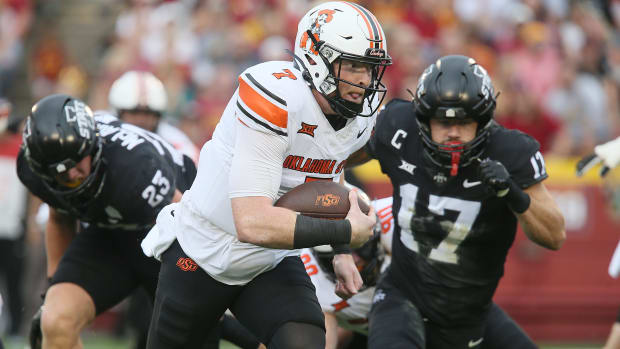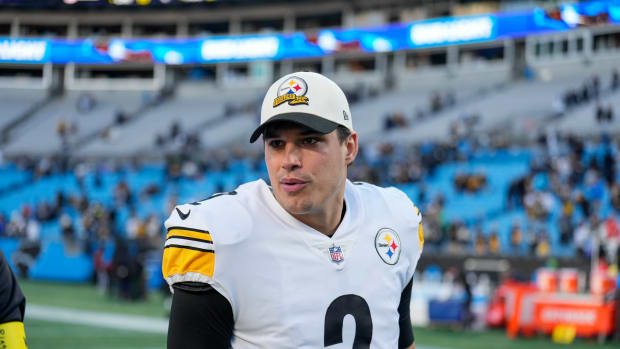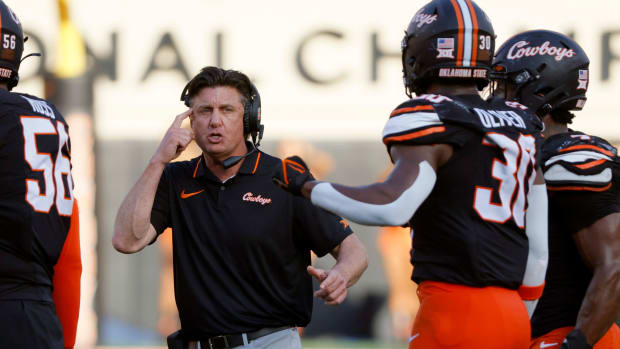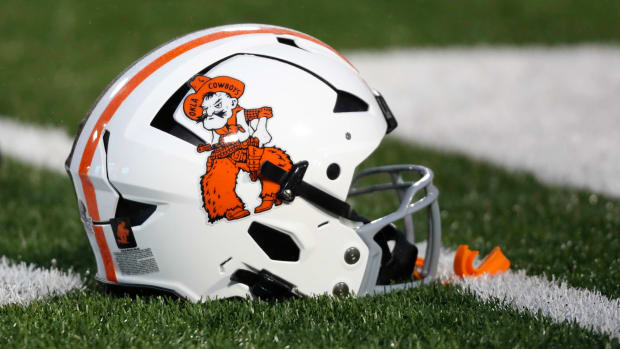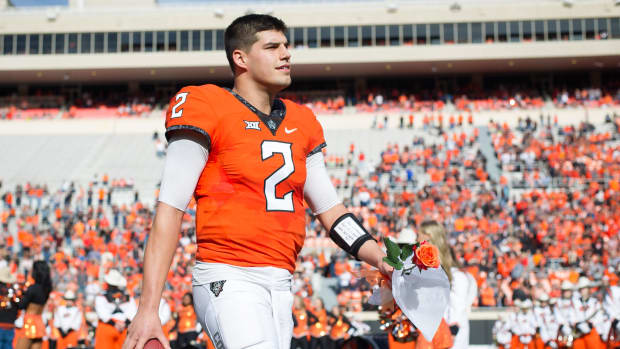Bob Bowlsby isn't Ready to Say the Sky is Falling, but Coronavirus Impact is Significant
STILLWATER -- The first words from Big 12 Commissioner Bob Bowlsby was that he hoped everybody and their families were doing well. Bowlsby, like all of the Big 12 Conference staff, is working from home. He said he is on teleconference calls and internet virtual meetings from virtually 7:30 a.m. to 7:30 p.m. interspersed with visits from his grandson and granddaughter. If you are looking for the quick synopsis, the money will be down and there is plenty of uncertainty, but if the COVID-19 pandemic threatens football, then the whole world of college athletics will change.
Admit it, you knew that. We've all been sitting here, self-isolating from all but a few family members with the hope that getting ahead of the expansion of this virus would give us a chance to have some normalcy and hopefully in time for football.
“It’s whole new ballgame if we find ourselves not playing football,” Bowlsby said several times during the teleconference with the media.
The loss of the bulk of the Big 12 Men's Basketball Tournament and the NCAA Men's Division I Championship in basketball will cost the Big 12 a big chunk of revenue. Just today (March 26) the NCAA announced that they will disperse $225-million to Division I schools this year down from the $611-million they passed out in 2019. The basketball tournament is the biggest reason for the loss of over $375-million in revenue.

Bob Bowlsby wasn't doom and gloom, but it was the cold, hard facts of coronavirus and college sports for about 45 minutes.
USA Today Sports Images - Jay Biggerstaff
Bowlsby added that the conference will lose roughly $6.6-million from cancellation of the Big 12 Men's Basketball Tournament. The Big 12 gets some extra revenue from the College Football Playoff by having Oklahoma as one of the four teams participating. The conference had about $1-million held back in surplus and will save somewhere in the neighborhood of $3.5 million by not hosting championship events in the spring and the downsizing and expenses saved at the conference office. They are still working on what the loss of sponsorship money will be from losing spring championship events.
The expectation is about $15-18-million less to be dispersed to Big 12 members from the conference at the end of the school year. Last year the Big 12 paid out close to $38-million per school and this year the payout could be closer to $30-million per school. There are still financial factors to be considered.
“For some schools that’s about half of their athletic budget, for others that’s about 20 percent,” Bowlsby said. “It’s not an equal situation."
The Big 12 will have their usual conference coaches meetings for the football, men's basketball coaches, and women's basketball coaches that are normally in Arizona will be conducted via teleconference. The Fiesta Bowl event that lured all the meetings to the Phoenix area is already cancelled. Bowlsby said the athletic director meetings for later in May and early June are still TBA.
There has been a lot of discussion over what schools can and can't do for athletes while they are off campus. While coaching staffs are meeting with Zoom and Team apps. The Big 12 and other power five leagues are not allowing for that or for them to send items to athletes.
Bowlsby said the Big 12 Board of Governors is meeting this Saturday and that will be a main topic of discussion. Can schools send nutritional supplements, protein bars, shoes, sweats, stretching belts, anything with regards to athletic performance, workouts, and nutrition. He said all the conferences were trying to stay on an even playing field with this and felt it would be settled this weekend.
As far as spring football, the Big 12 commissioner basically said that ship has sailed, but he had an interesting theory depending on when students could get back on campus. The basic thought is there is no game plan for what everybody is dealing with. If you get student-athletes back on campus in June, football could have OTAs or mini-camps similar to the NFL. Get the coaches with them and then have them focus on strength and conditioning and then get them back with the coaches some. It is all contingent on when the COVID-19 lets up and allows for any of this.
Bowlsby also mentioned that his participation with the committee for the NCAA looking at the new legislation that is done in California, Florida, and Colorado allowing student-athletes to profit from their name, image, and likeness is still going. They are meeting via teleconference, but still plan to have their report to the NCAA Board of Governors on time. There are now 35 other states beside the three that have passed that have legislation on this at some stage in their state legislature.
The commissioner said he wasn't really thinking about the advent of the television contracts and negotiations coming up or any conference realignment. Some has been rumored recently, For instance, in The Athletic one story said Bowlsby should pursue the better schools in the Pac-12 and bring them in.
"All of that was about capturing cable households and that doesn't apply anymore," Bowlsby said.
When I hinted getting better schools and increasing the overall television footprint might help, he countered.
"I think our coaches would tell you we are competitive enough right now," he answered. "Our games are very competitive and tough to win. You don't want to bring in more schools to slice up the same pie."
Yes, but you get some additional good schools, some large television markets, and then you get bigger television contracts. More pieces slicing up more pie.
I expected his answer. You can't come out and announce what you are going to do. It's not very smart. You just go do it when the time is right.
But, again, the major takeaways are that money is about to become tighter and conference revenue will be down as expected. Then anybody that is a friend to college athletics and wants the American tradition to stay around in some semblance of what it has been had better cooperate and hope we bust the curve and slow down the coronavirus in time to have a football season.

If this isn't a part of our fall then college sports will be taking a major financial tumble. Bowlsby is hopeful, but cannot see the future.
Pat Kinnison - Pokes Report chief photographer
No football changes everything. Bowlsby called it the driver. It drives popularity, drives television revenue, drives on campus revenue with ticket sales. It is the big engine.
“It affects everything we do,” Bowlsby said. “It affects the largest part of our TV contract, the largest source of campus revenue, which is live gate. Anything I say regarding finances has to make the assumption we’ll be back to playing football in the fall. If that doesn’t happen, the underpinning of what we’ve known as normal goes away and we’ll have major changes to make.”
